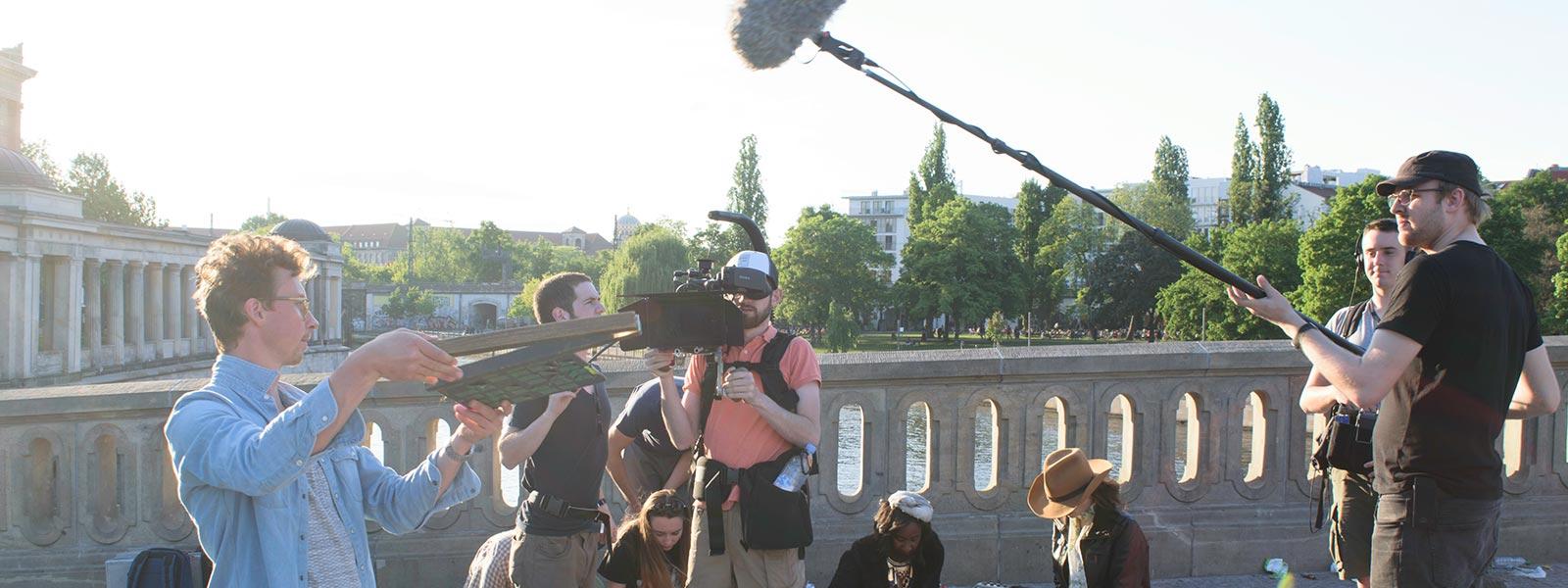The sky's the limit for UNCSA Filmmaking at 25 years
In 2014, School of Filmmaking Dean Susan Ruskin looked out her office window, enjoying her front row, center stage view of the New Media Building under construction. She’d been dean for just over a year—the year that marked the Film School’s 20th anniversary—when she took time to reflect on its history and its future.
“To think that none of this was here 20 years ago, not the buildings, or the faculty or the students, it boggles the mind,” she said at the time. “It is truly remarkable how far this program has come.”
Explore this story from different perspectives:
A Chancellor’s vision
Five years later, as the film school celebrates its 25th anniversary, Chancellor Lindsay Bierman thinks remarkable might be an understatement. He arrived in fall of 2014 and is quick to list indicators of the Film School’s success.
Consider:
- The School of Filmmaking has been recognized by all the major film industry publications, including The Hollywood Reporter, Variety, The Wrap and MovieMaker magazine. “I’m especially proud of the continued recognition by publications and blogs created by and for industry insiders,” Bierman says. “These are platforms that reach our influencers, so their recognition is very valuable to us.”
- In the past decade, Film School undergraduate enrollment has grown by 23 percent to a current headcount of 314. Graduate enrollment is six times what it was in 2009-10, spurred in large part by new MFA programs in Creative Producing and Screenwriting. “The school’s growth reflects the extraordinary success of its alumni; the strength of a rigorous curriculum designed to provide hands-on learning by doing; and a cutting-edge interdisciplinary learning environment that allows for collaboration across each of UNCSA’s arts schools,” Bierman says.
- The school leapt to the forefront of cutting-edge virtual reality and augmented reality (AR/VR) storytelling, and it launched the Media and Emerging Technology Lab (METL) to both define and shape the impending evolution of how immersive story content will be created, consumed and told. “We’ve positioned UNCSA to lead the development of content on platforms that will disrupt not only the film and entertainment industry, but nearly every industry,” Bierman notes.
- Alumni have contributed to critically-acclaimed and award-winning films and television shows, and their work is regularly tapped for prestigious festivals including Sundance, Cannes, Tribeca and Berlinale. “We’ve graduated some of the industry’s greatest directors, sound designers, screenwriters, and storytellers,” Bierman says. “There’s a certain quality that defines the work of UNCSA film grads, and it’s never sensationalist, pretentious, or overwrought--I’m waiting for the UNCSA style to be fully articulated and celebrated.”
An enthusiastic champion of each of UNCSA’s conservatories—Dance, Design and Production, Drama and Music in addition to Film—Bierman considers himself fortunate to have befriended the man whose vision brought the Film School to life, Chancellor Emeritus Alex C. Ewing. Bierman believes Ewing, who died in 2017, would be especially proud of the Film’s Schools cutting-edge innovations, which prepare students for the accelerated pace of change in the entertainment industry and beyond.
“I know from our many long conversations that Alex wanted us to lean into the future, as he did as Chancellor,” Bierman says. “We will continue build on his legacy and on over 50 years of artistic transcendence in all its forms.”
Ewing led the School of the Arts from 1990 to 2000 and he began work to establish the Film School almost the minute he arrived. ACE Exhibition complex, which includes three state-of-the-art motion picture theatres and BB&T Lobby, was named in his honor.
Back in 2014, he retraced the history of how the Film School was created. “The idea (of creating a film school) had been around for a while,” he said. “It was not revolutionary.”
But while others had only dreamed of the possibilities, Ewing set out to make the film school a reality. “I thought it was imperative to complement the training of the students, particularly those in Drama and Design & Production,” Ewing said in 2014. “And there was a strong possibility of students getting jobs in film.”
Ewing embarked on his pet project in the spring of 1991 by consulting renowned author and School of the Arts founder John Ehle. Ehle, who died earlier this year, referred Ewing to film producer Borden Mace. A North Carolina native who died in 2014, Mace had produced the film based on Ehle’s novel “The Journey of August King.” He had also founded the North Carolina School of Science and Math in Durham. Ewing coaxed Mace out of retirement to lead the creation of the film school.
In 1992, the Board of Governors of the University of North Carolina approved the idea of the School of Filmmaking. “They said we could plan it, but we weren’t authorized to actually create it,” Ewing said.
Ewing, Mace and their quickly assembled board of advisors began looking for a dean to lead their school, and they advertised for students. Those actions earned them a scolding from C.D. Spangler, who was president of the UNC system and Ewing’s boss. “He told us we were on a short leash,” Ewing remembered.
But they persevered, hiring Sam Grogg as the first dean. Grogg had been president and chief operating officer of Apogee Productions and Magic Pictures Inc. and had produced films including “Kiss of the Spiderwoman” and “The Trip to Bountiful.”
“Sam was amazing. He is the founding father of the film school,” Ewing said. “We had no money, no space, no model. We had a concept, and we had Sam’s vision. He got us off the ground.”
Sam was amazing. He is the founding father of the film school. We had no money, no space, no model. We had a concept, and we had Sam’s vision. He got us off the ground.
Chancellor Emeritus Alex C. Ewing on Film School Dean Sam Grogg
In September 1993, the School of Filmmaking opened in the barely renovated, sparsely equipped Pearce Building, a one-time diaper laundry that had most recently housed elements of the School of Design and Production. Five faculty members were on board to teach 58 students.
In 1993, the N.C. General Assembly appropriated $7.9 million for construction of sound stages, production facilities and exhibition spaces. Another $7 million was approved by taxpayers that year as part of the state’s largest-ever bond package. The school broke ground on the Film Studio Village in October 1995, and the new buildings were dedicated in April 1998. Meanwhile, in May of 1997, the school graduated its first class.
Grogg left in 1998, and Dale Pollock became dean from 1999 until 2006, when he stepped into a faculty role, teaching directing and cinema studies.
“Dale Pollock was just the person we needed at that time,” Ewing said. “He provided a more structured approach that was important for the school to continue.”
Pollock has produced 13 feature films, including “Set it Off,” “Mrs. Winterbourne,” “A Midnight Clear,” The Beast” and “Blaze.” His films have received four Academy Award nominations. He was chief film reviewer for Daily Variety, and chief film reporter for the Los Angeles Times, where he was a Pulitzer Prize nominee. He now bears the title of Distinguished Scholar at UNCSA.
The third dean, Jordan Kerner, served from 2007 to 2012. A veteran Hollywood producer (“The Smurfs S 1 and 2”, “Charlotte’s Web” and “Fried Green Tomatoes”), he reimagined the manner in which film, animation, gaming and other new media are taught at UNCSA. He also advocated for the funding of the New Media Building as part of a $46.74 million bond package.
The newest addition to the film village, the 30,000-square-foot, state-of-the-art New Media Building was brought online by Ruskin, the fourth dean to lead the film school in its rapid ascent to national ranking.
The facility includes up-to-date hardware and software, especially for digital design, gaming, animation and visual effects—areas that Ruskin identified years ago as the future of filmmaking and crucial for the training of her students.
The Dean leans in
Since becoming Dean, Ruskin has guided the Film School’s emergence as a pioneer in another rapidly developing trend that will continue to transform the film industry – immersive entertainment, including augmented reality and virtual reality (AR/VR). Since the beginning of her tenure she has been planning – and saving – for changes to the curriculum and updated equipment that would place UNCSA Film at the forefront of creating narrative content in the emerging digital environment.
Industry insiders took note. In 2017, UNCSA School of Filmmaking was one of 11 schools nationwide chosen by Facebook-owned Oculus, a VR technology company, to receive state-of-the art equipment, guest lectures from experts in the virtual reality field, and opportunities for students and faculty to engage with industry leaders. Other companies including Radiant Images, Advanced Microdevices and Technicolor, have supported UNCSA as a pioneer in the AR/VR space.
“This is cutting-edge equipment, the most advanced technology available,” Ruskin says. “Oculus is the worldwide leader in virtual reality technologies and they are providing a remarkable opportunity for our students to experience storytelling with the technological tools that the industry is using.”
Also in 2017, about 50 students from every film discipline worked alongside professional filmmakers to produce a VR pilot called “DecipHER.” Guest artists for the project included Jacquie Barnbrook, producer of the Martian VR Experience and visual effects producer of “The Jungle Book” and “The Hunger Games;” Eric Hann, cinematographer, visual effects supervisor and VR photographer; and Alexa Hann, a writer, director and producer who started her career at Disney but transitioned into developing VR projects.
Watch the making of “DecipHER” below:
“When I first started looking into virtual reality it seemed apparent that this was the way the world was going,” Ruskin says. “It felt to me the best way for our students to really learn was to get up on their feet, do a production and do it with people who have the experience.”
Both Ruskin and Bierman realized the potential impact AR/VR could have on North Carolina’s economy. Multinational financial giant Goldman Sachs estimates that by 2025, revenues for AR/VR industries could reach $180 billion, driven by hardware, games, branding, narrative storytelling, and commerce. Companies like Facebook, Google, and Microsoft have joined venture capitalists around the world in pouring billions of dollars into developing these technologies.
“As a constituent of the University of North Carolina System, UNCSA can leverage our state’s leading programs in technical innovation, bio-medical research, and engineering to accelerate home-grown start-ups in AR/VR,” Bierman says.
METL recently hosted the inaugural Future of Reality Summit to initiate cross-field discussion to explore immersive storytelling strategies and the use of emerging technologies to engage audiences. Through the summit, METL established a network of executives, practitioners, researchers and thought leaders from companies and organizations including Oculus, Paramount Pictures, Lowe’s Innovation Labs, D Box Technologies, Mass Animation, Tribeca Film Institute and Unity Technologies Labs.
While immersive media and the opportunities spearheaded by METL are getting a lot of attention as the Film School commemorates its 25th anniversary year, Ruskin says those projects would not be possible if the school hadn’t built a strong foundation in traditional storytelling for film and television.
It is not about the technology. It is about telling a story. We are teaching students the craft of storytelling, through writing, directing, cinematography, production design, and all of our disciplines. And we are equipping them with the curiosity, the creativity and the agility to learn the technology that enables them to do that.
Film Dean Susan Ruskin
“it is not about the technology. It is about telling a story,” she says. “We are teaching students the craft of storytelling, through writing, directing, cinematography, production design, and all of our disciplines. And we are equipping them with the curiosity, the creativity and the agility to learn the technology that enables them to do that.”
Giving credit to the faculty
Ruskin credits the faculty—which has grown from the original five to more than two dozen—for developing new generations of filmmakers who are able to walk onto any film or television set and contribute to the creation of iconic works like NBC’s “This Is Us,” HBO’s “Eastbound and Down, Hulu’s “The Handmaid’s Tale” and films as diverse as “Lady Bird” and “Dirty Grandpa.”
Film faculty are working artists who maintain close ties in the industry. They have won or been nominated for Academy Awards, Emmys, Golden Globes, Golden Reels, CINE’s Golden Eagles, MTV Music Awards, National Film Critics and Cable Ace Awards, among others. Their work has been screened and honored at festivals including Sundance, Cannes, South By Southwest, Tribeca, Venice, Toronto and RiverRun. They’ve worked for award-winning programs on nearly every network and streaming platform.
“And they are exceptional educators and mentors,” Ruskin added, noting that several have won UNCSA Teaching Excellence Awards. “They are as dedicated to teaching as they are to their craft.”
Faculty expertise is supplemented by frequent guest artists who are prominent in the industry. Recent visitors include Ted Hope, head of Motion Picture Production for Amazon Studios; Peter Block, former president of Acquisitions at Lionsgate; and Yair Landau, former vice chairman and president of Sony Pictures Digital Entertainment.
“Colleagues like Ted, Yair and Peter want to come here and interact with our students, and they have a tremendous amount of knowledge, expertise and insight to offer,” Ruskin said.
Alumni share the love
Alumni also are eager to return. Most recently, Jeff Fradley (’98) Danny McBride (’99) and David Gordon Green (’98) returned to screen their “Halloween” reboot in advance of its record-breaking national release. Last year editor Zene Baker (’98) brought his “Thor: Ragnarok” to screen on campus a week after it commanded a $120 million opening weekend.
See “Halloween” alumni share their career advice with students:
Other alumni who have returned as guest artists include:
- Matthew Brown (’05), director of “Maine,” which was recently nominated for Best Narrative Feature at Tribeca Film Festival. He also wrote and directed “In the Treetops,” earning a nomination for the Zeitgeist Award at the Los Angeles Film Festival, and was sound designer and editor for the web series “Today in New York.”
- Rebecca Green (’01), co-founder of the production company Two Flints, launched with the independent horror sensation “It Follows.” The film premiered at the 2014 Cannes Film Festival and went on to screen at the 2014 Toronto International Film Festival and 2015 Sundance Film Festival. Green was named to Variety’s 2015 “10 Producers to Watch” list and was nominated for the Piaget Producer's Award at the 2016 Film Independent Spirit Awards. In 2017 she was a Woman at Sundance Fellow;
- Brett Haley (’05), writer, director and producer of “The Hero,” which was nominated for a Grand Jury Prize at Sundance. He also wrote and directed “Hearts Beat Loud,” chosen for the opening night film at RiverRun International Film Festival, and “I’ll See You in My Dreams.”
- Jeff Nichols (’01), writer and director of “Loving” which was nominated for a Palm d’Or at Cannes, “Mud,” which won the Robert Altman Award and was nominated for Best Director at Independent Spirit Awards, and “Take Shelter,” nominated for a Grand Jury prize at Sundance, winner of the FIPRESCI Award at Cannes, and nominated for best director at Film Independent Spirit Awards.
“The School of Filmmaking has alumni connections in the film industry in all areas of filmmaking,” Ruskin says. “Our graduates are represented at all levels in studios and agencies and in film and television across the country.”
In fact, she says, alumni frequently work together on projects, and they recruit current students for internships and summer work.
“It’s called the UNCSA Film Mafia,” she says. Because they have been through the program, alumni like David Gordon Green (director of “Your Highness” and “Pineapple Express”), Martha Stephens (writer/director of “Land Ho!”), Will Files (sound designer for “The Smurfs,” “Take Shelter” and “Tree of Life”) and Vera Herbert (writer/producer of “This is Us”) recognize the quality and depth of the training.
“They know that students are working on films beginning their first semester straight through the senior thesis projects, gaining access to every facet of the discipline,” Ruskin says. “That is unique among our peer institutions and it makes for highly qualified filmmakers.”
Ruskin says the reputation of the faculty and alumni is what draws smart and creative students to the program in numbers that continue to skyrocket. Undergraduate applications are up 87 percent in five years.
“We have come so far in such a short period of time,” she says. “The talent and dedication of our faculty and the success of our alumni indicate that the sky is the limit.”












